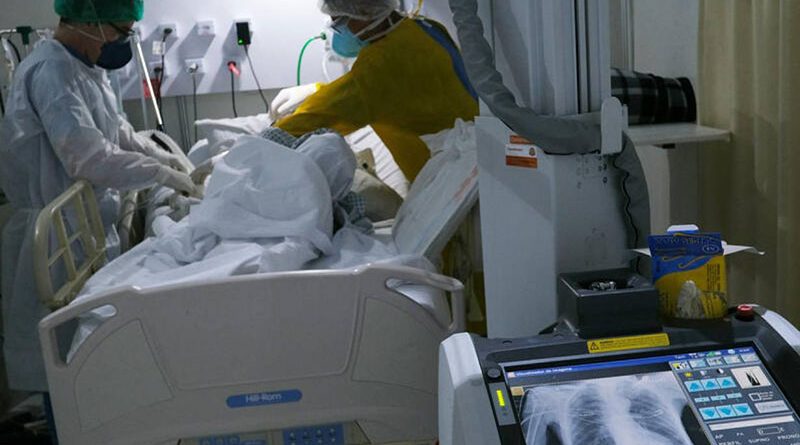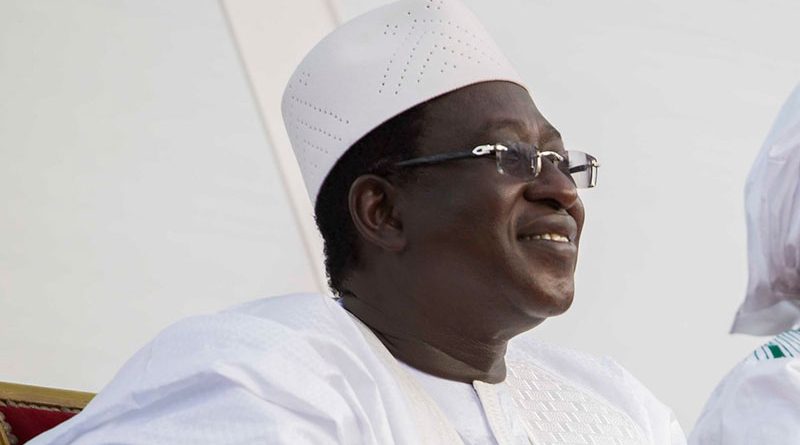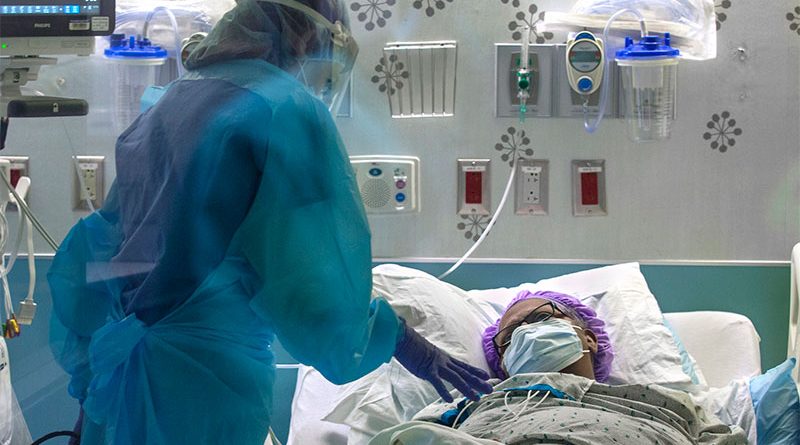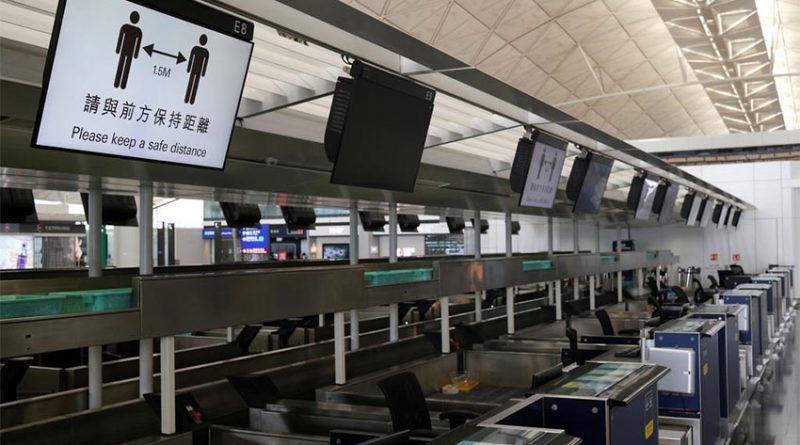SOUTH Africa’s total coronavirus infections since the first case in March crossed a million on Sunday, its Health Ministry said, just days after a new faster-spreading variant was confirmed to be present in the country.
The grim milestone comes nine days after the country, the worst hit in Africa, reported 900,000 cases. The country had taken two weeks to reach 900,000 from the 800,000 seen early in December.
Several hospitals and medical centres have reported wards overflowing with patients with many healthcare workers cancelling their vacations to tackle a huge influx of patients.
Mediclinic International Plc, among the top three private hospital networks in the country, said on Sunday that a severe rise in cases had placed a very heavy strain on available healthcare resources including staff, equipment and beds to provide intensive treatment for seriously ill patients.
“The numbers of patients seeking care within our hospitals has exceeded previous numbers during the first peak and the majority of our ICU and High Care units are operating at capacity,” the company said, referring to the Western Cape province.
The new variant, referred to as 501.V2, was discovered by a network of scientists around South Africa who have been tracking the genetics of the virus. The variant appears to be focused in the south and southeast of the country and has been dominating findings from samples collected since October, they say.
The Coronavirus Command Council, the top government body monitoring the disease, met on Sunday to decide on whether further measures such a tighter lockdown or stricter rules on public movement should be imposed, according to local media News24.
“Today, we have breached one million cumulative cases of COVID-19 in South Africa, with a cumulative total of 1,004,413 cases reported,” the ministry said in a statement late Sunday.
The total number of deaths touched 26,735.
The number of the daily rise in infections has already crossed the July peak when the cases topped just shy of 14,000. Daily infections on December 25 was the highest so far with 14,796 cases.
Since the new variant was announced, several countries cancelled flights to the country, pounding the already bruised travel and tourism sector.
For an interactive graphic, click https://tmsnrt.rs/2Kx1cMO
Source – Thomson Reuters Foundation
THE long-time leader of Mali’s opposition, Soumaila Cisse, has died at the age of 71, his spokesman said, two months after his release from lengthy captivity by Islamist insurgents.
Cisse, a former finance minister who finished runner-up in the 2013 and 2018 presidential elections to Ibrahim Boubacar Keita, was considered among the favourites in a vote expected in early 2022 after Keita’s overthrow in an August military coup.
“I confirm that Soumaila died last night in Paris,” his spokesman, Nouhoum Togo, told Reuters without providing further detail. French media reported that he had died of COVID-19.
Cisse was kidnapped in March by gunmen while campaigning for legislative elections in the northern region of Timbuktu. He was released in October alongside French aid worker Sophie Petronin and two Italian hostages.
While he was being held, a military junta overthrew Keita, blaming him for persistent insecurity caused by jihadists linked to al Qaeda and Islamic State as well as high-level corruption.
Under pressure from regional states, the junta officially ceded power in September to a transitional government that will govern for 18 months. However, military officers retain sweeping influence across the government.
Source – Thomson Reuters Foundation
MATRON Annamarie Odendaal has cancelled all staff holiday on the COVID-19 ward at the private Arwyp Medical Centre in Johannesburg as a second wave of the coronavirus threatens to overwhelm South Africa’s health system.
“I called them back because we are in a peak period now, so it’s not easy for the staff because they also want to go back to their family members,” she told Reuters on the ward on Christmas Day.
“Sometimes they are tired but they never say ‘I can’t come to work’. The patient is really always first for them.”
A confluence of school holidays, public laxity and a new, potentially more infectious variant of the virus has left authorities scrambling to counter an earlier-than-expected resurgence of infections that saw new daily cases spike nearly seven-fold from a month ago to top 14,305 on Dec. 24.
Amid the beeps of monitors and ventilators, 60-year-old Odendaal said the situation was getting worse as hospital beds filled up quickly.
Several countries, including Britain which has found the mutant variant in cases linked to South Africa, have banned flights from the country, disrupting holiday travel plans and frustrating tour operators.
The latest data showed the infection tally so far rising to 968,563 on Thursday. If the trajectory continues, South Africa would breach the million mark as early as Sunday, a Reuters tally showed.
South Africa has recorded 25,983 deaths, the highest figure on the continent.
EMOTIONAL TOLL
At Cape Town’s Groote Schuur public hospital, where the world’s first human-to-human heart transplant was performed in 1967, intensive care nurse Verna Collins said she was physically and emotionally drained.
“We thought we were at the end in October, early November, and now this dark cloud is circling again, so emotionally it takes a lot out of the nursing staff,” Collins said outside the hospital on a brief break from the COVID-19 ICU ward, which has reached capacity.
Dressed in theatre scrubs and a red Santa hat, the mother of one said she had been scheduled to work on Christmas Day but several of her workmates had had to cancel their holiday plans after being called back.
Private hospital group Mediclinic said the number of patients seeking care at its hospitals in Western Cape and rising incidents in KwaZulu Natal and Gauteng had already exceeded those in the first peak and the majority of its ICU and high care units were operating at full capacity.
“With the new strain we saw that the patients are not recovering so easy and this is a problem,” said matron Odendaal.
During the first wave earlier this year, her hospital had fewer ICU patients, but now “they do not respond well under treatment so they do end up in ICU 90% of the times.”
Source – Thomson Reuters Foundation
HONG KONG has extended a compulsory quarantine by an extra seven days to 21 days for all visitors outside China, effective Friday, in stepped-up efforts to prevent a new variant of the novel coronavirus from spreading.
Authorities also banned all people who have stayed in South Africa in the past 21 days from boarding for Hong Kong.
Hong Kong has already banned all flights arriving from the United Kingdom from Monday and the city said on Wednesday two students who returned from the UK were likely to be infected with the new super-virulent strain of COVID-19.
In statement midnight on Friday, authorities said people who have stayed in places outside China during the 21 days before their arrival have to undergo 21 days of compulsory quarantine in designated quarantine hotels.
“Noting the drastic change of the global pandemic situation with the new virus variant found in more countries, there is a need for the government to introduce resolute measures immediately… to ensure that no case would slip through the net even under very exceptional cases where the incubation period of the virus is longer than 14 days,” a government spokesman said.
Source – Thomson Reuters Foundation




